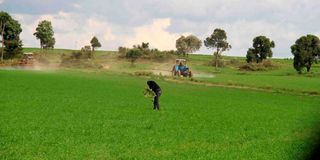New, robust wheat variety on the way

A tractor sprays herbicides at a wheat plantation in Rotian, Narok North Sub-county in April 2021.
Kenya is among countries that will closely monitor deployment of a new wheat variety in farmlands in the United States that is reported to withstand global heating and is without the blemish of genetic engineering.
Global wheat production has fallen because of global heating and the ongoing war between Russia and Ukraine, two nations that account for over a third of the world’s supplies.
On January 1, Chinese-owned agriculture company Syngenta, announced trials for the hybrid wheat variety, disclosing the first seeds will be released next year on 2,000 to 2,800 hectares of farmland in the US.
As Kenyans intensify their consumption of pasta, chapati, bread and mandazi, the shortfall in wheat production has fueled urgency in the search for alternatives to a commodity that forms a vital element at breakfast, lunch and dinner tables in many homes around the world.
Data from the country’s ministry of agriculture indicates that Kenya's consumption stands at 900,000 tonnes per year against local production of 350,000 tonnes per annum with Russia, Ukraine and South America key source markets for her wheat imports.
While assuring that their product has been created without genetic engineering, Syngenta explained hybrid wheat is created by taking away the natural ability of plants to pollinate themselves.
Scientists then pollinate female wheat plants by male plants of a different line.
They say that the goal of the process is to create seeds that can produce bigger yields and better resist harmful environments.
They highlight that using this hybrid technology permits breeders to choose the best elements from two parent seeds to produce new seeds containing the best characteristics of both.
"We are moving from developing leading conventional varieties to commercialising wheat hybrid. We have gone through a proof of concept protocol, which has been successful, and now we're developing the technology to launch the first hybrids by the end of this decade,” Carlos Iglesias who is the company’s head of North America wheat breeding explains on the official site.
"We need hybrids that will deliver sustained performance improvement," he added. "There is great expectation around hybrid wheat, and we are confident we will succeed in bringing superior hybrids to the market that will help our customers succeed and enhance the world's capacity to feed a growing population."
Their announcement comes after scientists at the Indian Council of Agricultural Research (ICAR) last year released a new heat-resistant variety of the crop which they said grows to maturity in 100 days.
They explained that the production as well as quality of wheat can suffer when temperatures rise above optimal levels.
The experts are of the view that wheat is particularly vulnerable to heat stress during the “anthesis” stage — when the crop flowers.
This means that during this critical stage, if the crop is exposed to heat over the average of 23 degrees Celsius, the grain starts maturing faster, and ‘fills up’ less thus resulting to a lower yield.





